外研版英语八年级下册课件M8 Unit 1 I can hardly believe we’re in the city centre. (共23张PPT)
文档属性
| 名称 | 外研版英语八年级下册课件M8 Unit 1 I can hardly believe we’re in the city centre. (共23张PPT) |
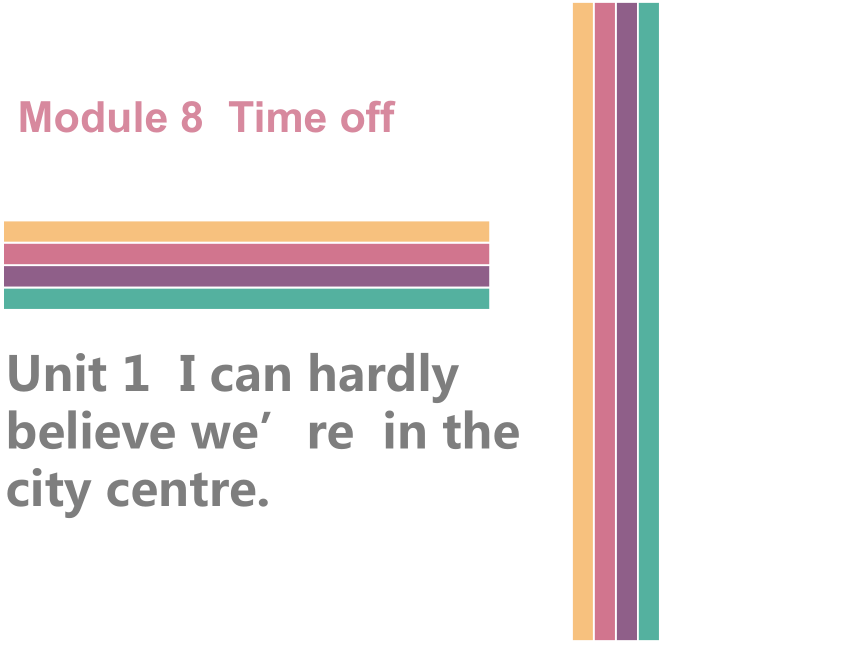
|
|
| 格式 | zip | ||
| 文件大小 | 1.7MB | ||
| 资源类型 | 教案 | ||
| 版本资源 | 外研版 | ||
| 科目 | 英语 | ||
| 更新时间 | 2017-03-10 00:00:00 | ||
图片预览

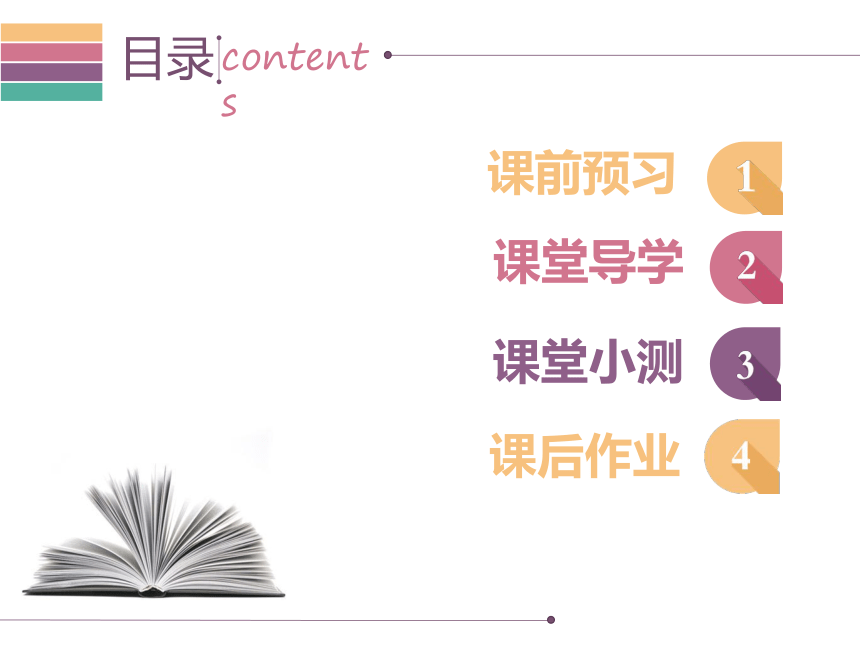

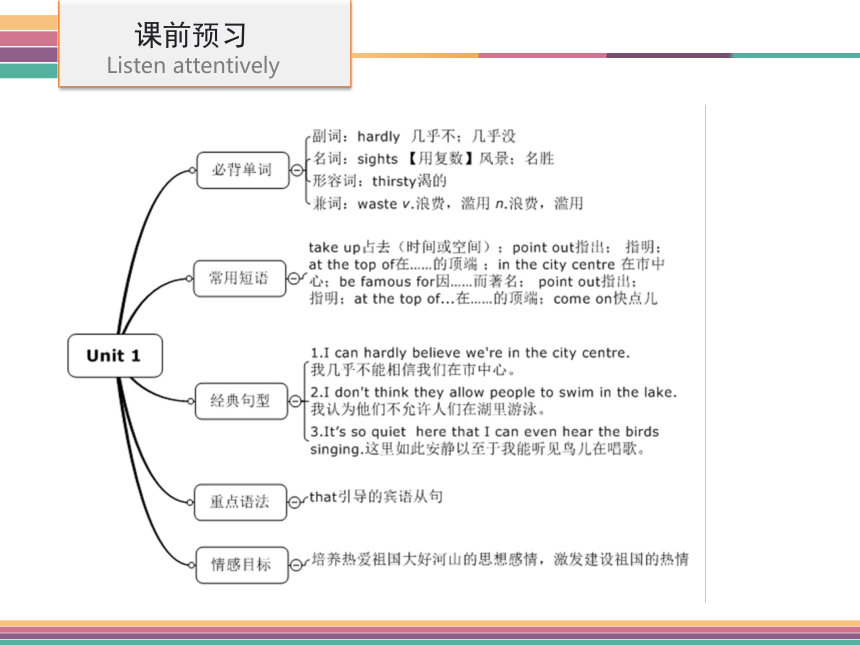

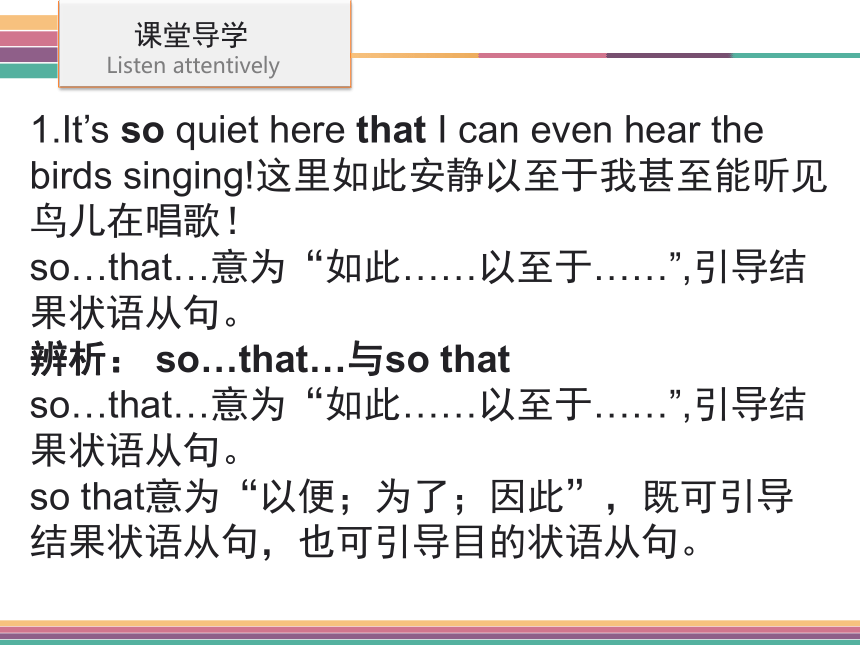

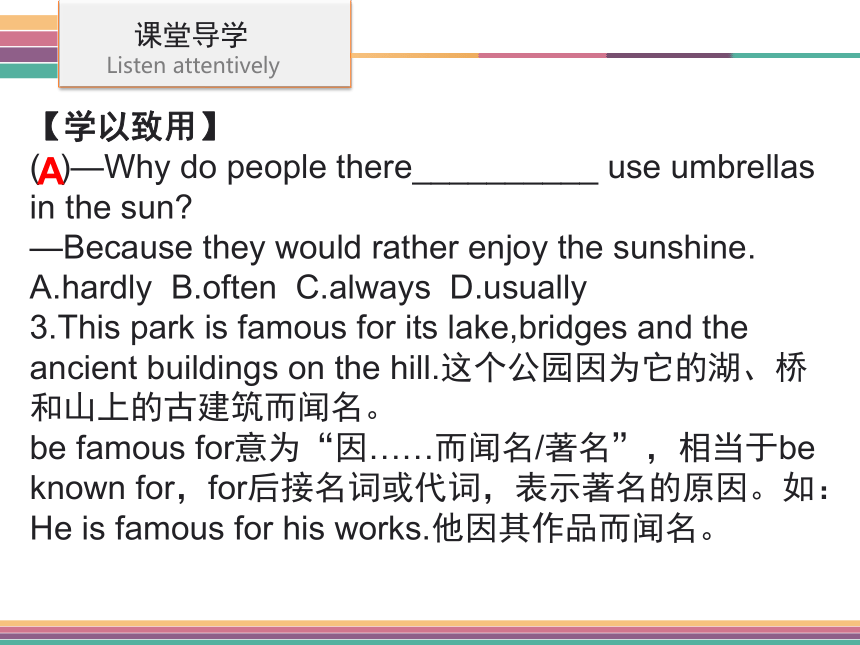
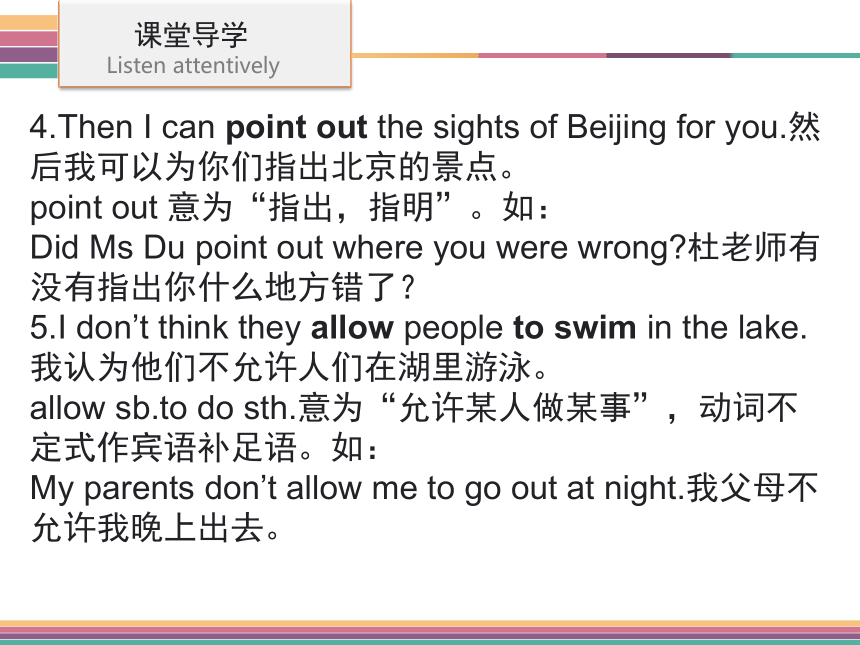
文档简介
课件23张PPT。Unit 1 I can hardly believe we’re in the city centre.Module 8 Time off目录contents课前预习课堂导学课堂小测课后作业课前预习目录contents课堂导学目录contents1.It’s so quiet here that I can even hear the birds singing!这里如此安静以至于我甚至能听见鸟儿在唱歌!
so…that…意为“如此……以至于……”,引导结果状语从句。
辨析: so…that…与so that
so…that…意为“如此……以至于……”,引导结果状语从句。
so that意为“以便;为了;因此”,既可引导结果状语从句,也可引导目的状语从句。【学以致用】 用以上词完成句子。
(1)I got up early______________________ I could catch the early bus.我起床很早,以便能赶上早班公共汽车。
(2)He was ______________________ he couldn’t say a word.他很生气,以至于说不出一句话。
2.I can hardly believe we’re in the city centre.我几乎不能相信我们在市中心。
hardly副词,意为“几乎不;几乎没”,含有否定的意味。在句中常置于连系动词be、助动词、情态动词之后,行为动词之前。如:
She hardly ate anything last night.她昨天晚上几乎什么也没吃。so thatso angry that 【学以致用】
( )—Why do people there__________ use umbrellas in the sun?
—Because they would rather enjoy the sunshine.
A.hardly B.often C.always D.usually
3.This park is famous for its lake,bridges and the ancient buildings on the hill.这个公园因为它的湖、桥和山上的古建筑而闻名。
be famous for意为“因……而闻名/著名”,相当于be known for,for后接名词或代词,表示著名的原因。如:
He is famous for his works.他因其作品而闻名。A4.Then I can point out the sights of Beijing for you.然后我可以为你们指出北京的景点。
point out 意为“指出,指明”。如:
Did Ms Du point out where you were wrong?杜老师有没有指出你什么地方错了?
5.I don’t think they allow people to swim in the lake.我认为他们不允许人们在湖里游泳。
allow sb.to do sth.意为“允许某人做某事”,动词不定式作宾语补足语。如:
My parents don’t allow me to go out at night.我父母不允许我晚上出去。课堂小测目录contents一、根据中文意思或首字母提示,用单词的适当形式填空。
1.I can h_________finish the work in a day.
2.My parents won’t a_________me to come back late.
3.If you see that boy, please p_________him out for me.
4.You can point out the __________________ (名胜) of Beijing from the top of the hill.
5.China is _________(著名的) for the Great Wall.ardly llow oint sightsfamous二、根据句意和汉语提示完成句子。
1.欢迎来北海公园。
______________________ Beihai Park.
2.这里如此安静以致我甚至可以听到鸟叫声!
It’s__________ quiet here__________ I can even hear the birds__________!
3.我确信在山顶看整座城市一定很美。
I’m sure it’ll be fantastic______________________ the city from the top.Welcome tosothatsingingto see4.我认为他们不允许人们在湖里游泳。
I______________________ they allow people______________________ in the lake.
5.——快点! 我们不要再浪费时间了。
——好吧。我希望在上面那里会更凉爽。
—______________________! Let’s__________ waste______________________ time.
—All right.I hope it will be cooler up there.don’t thinkto swimCome onnotany more三、单项填空。
( )1.The box__________ too much room, please take it out of the room.
A.takes up B.take up C.takes off D.take off
( )2.If there are mistakes, please__________ for me.
A.point it out B.point them out
C.point out it D.point out them
( )3.I can__________ believe the wind is so strong.
A.hard B.hardly C.sometimes D.oftenABB( )4.They hope to stand__________ the top of the mountains one day.
A.at B.on C.to D.in
( )5.He felt__________ curious that he asked__________ many questions about it.
A.such; such B.so; so
C.such; so D.so; suchAB课后作业目录contents4一、单项填空。
( )1.David was so excited at the good news that he could__________ say a word.
A.nearly B.hard C.ever D.hardly
( )2.—Tony, welcome__________ Beijing.
—Thank you.
A.in B.to C.for D.on
( )3.Listen! I can hear someone__________ in the next room.
A.to sing B.sing C.sings D.singingDBD( )4.Be careful! The ice isn’t thick.It’s better__________ on it.
A.to skate B.not to skate
C.skating D.not skate
( )5.The teacher is sure__________ the students can hear him clearly.
A.this B.where C.that D.whatBC二、用所给单词的适当形式填空 。
1.Listen! Can you hear someone _________(sing) in the next room?
2.Why don’ t we _________(have) a picnic next weekend?
3.Let’s _________(not wait) any more.There’s little time left.
4.They don’ t allow people _________(talk) loudly here.
5.I’m sure that it _________(be) very hot there.
6.It’s better _________(do) something late than never.singinghavenot waitto talkwill beto do三、完形填空。
Nowadays, more and more people like to travel in their holidays.The other day I read a report about the 1 people spend their holidays.It is reported that in recent years several new holiday habits have developed. 2 them,the most interesting one is the growth of holiday camps.
From the report we can see that in 1990,forty percent(百分比) of people stayed at 3 for their holidays.However, now the percentage has fallen to nine percent.Morepeople go out for fun.People enjoy the fresh air,clean water and green hills when they go camping in places far 4 the city.In 1990,thirty-eight percent of people 5 going to the seaside 6 in 2002 only twenty-seven percent preferred to go there.What great changes!
7 have those changes taken place? I think there are several reasons.First, it’s because people can 8 to travel.Second,people prefer to live a high quality and colourful life.Third, their 9 to relaxation have changed.Fewer and fewer people want to save 10 money by living a simple life.( )1.A.time B.ways C.meanings D.cities
( )2.A.Between B.Around C.Among D.With
( )3.A.places of interest B.villages
C.seaside D.home
( )4.A.from B.in C.to D.of
( )5.A.hoped B.enjoyed C.stopped D.disliked
( )6.A.when B.where C.while D.as
( )7.A.What B.Why C.How D.When
( )8.A.cost B.save C.afford D.spend
( )9.A.attitudes B.rules C.games D.partners
( )10.A.little B.a lot of C.few D.noBCDABCBCAB谢
谢
观
看
!
so…that…意为“如此……以至于……”,引导结果状语从句。
辨析: so…that…与so that
so…that…意为“如此……以至于……”,引导结果状语从句。
so that意为“以便;为了;因此”,既可引导结果状语从句,也可引导目的状语从句。【学以致用】 用以上词完成句子。
(1)I got up early______________________ I could catch the early bus.我起床很早,以便能赶上早班公共汽车。
(2)He was ______________________ he couldn’t say a word.他很生气,以至于说不出一句话。
2.I can hardly believe we’re in the city centre.我几乎不能相信我们在市中心。
hardly副词,意为“几乎不;几乎没”,含有否定的意味。在句中常置于连系动词be、助动词、情态动词之后,行为动词之前。如:
She hardly ate anything last night.她昨天晚上几乎什么也没吃。so thatso angry that 【学以致用】
( )—Why do people there__________ use umbrellas in the sun?
—Because they would rather enjoy the sunshine.
A.hardly B.often C.always D.usually
3.This park is famous for its lake,bridges and the ancient buildings on the hill.这个公园因为它的湖、桥和山上的古建筑而闻名。
be famous for意为“因……而闻名/著名”,相当于be known for,for后接名词或代词,表示著名的原因。如:
He is famous for his works.他因其作品而闻名。A4.Then I can point out the sights of Beijing for you.然后我可以为你们指出北京的景点。
point out 意为“指出,指明”。如:
Did Ms Du point out where you were wrong?杜老师有没有指出你什么地方错了?
5.I don’t think they allow people to swim in the lake.我认为他们不允许人们在湖里游泳。
allow sb.to do sth.意为“允许某人做某事”,动词不定式作宾语补足语。如:
My parents don’t allow me to go out at night.我父母不允许我晚上出去。课堂小测目录contents一、根据中文意思或首字母提示,用单词的适当形式填空。
1.I can h_________finish the work in a day.
2.My parents won’t a_________me to come back late.
3.If you see that boy, please p_________him out for me.
4.You can point out the __________________ (名胜) of Beijing from the top of the hill.
5.China is _________(著名的) for the Great Wall.ardly llow oint sightsfamous二、根据句意和汉语提示完成句子。
1.欢迎来北海公园。
______________________ Beihai Park.
2.这里如此安静以致我甚至可以听到鸟叫声!
It’s__________ quiet here__________ I can even hear the birds__________!
3.我确信在山顶看整座城市一定很美。
I’m sure it’ll be fantastic______________________ the city from the top.Welcome tosothatsingingto see4.我认为他们不允许人们在湖里游泳。
I______________________ they allow people______________________ in the lake.
5.——快点! 我们不要再浪费时间了。
——好吧。我希望在上面那里会更凉爽。
—______________________! Let’s__________ waste______________________ time.
—All right.I hope it will be cooler up there.don’t thinkto swimCome onnotany more三、单项填空。
( )1.The box__________ too much room, please take it out of the room.
A.takes up B.take up C.takes off D.take off
( )2.If there are mistakes, please__________ for me.
A.point it out B.point them out
C.point out it D.point out them
( )3.I can__________ believe the wind is so strong.
A.hard B.hardly C.sometimes D.oftenABB( )4.They hope to stand__________ the top of the mountains one day.
A.at B.on C.to D.in
( )5.He felt__________ curious that he asked__________ many questions about it.
A.such; such B.so; so
C.such; so D.so; suchAB课后作业目录contents4一、单项填空。
( )1.David was so excited at the good news that he could__________ say a word.
A.nearly B.hard C.ever D.hardly
( )2.—Tony, welcome__________ Beijing.
—Thank you.
A.in B.to C.for D.on
( )3.Listen! I can hear someone__________ in the next room.
A.to sing B.sing C.sings D.singingDBD( )4.Be careful! The ice isn’t thick.It’s better__________ on it.
A.to skate B.not to skate
C.skating D.not skate
( )5.The teacher is sure__________ the students can hear him clearly.
A.this B.where C.that D.whatBC二、用所给单词的适当形式填空 。
1.Listen! Can you hear someone _________(sing) in the next room?
2.Why don’ t we _________(have) a picnic next weekend?
3.Let’s _________(not wait) any more.There’s little time left.
4.They don’ t allow people _________(talk) loudly here.
5.I’m sure that it _________(be) very hot there.
6.It’s better _________(do) something late than never.singinghavenot waitto talkwill beto do三、完形填空。
Nowadays, more and more people like to travel in their holidays.The other day I read a report about the 1 people spend their holidays.It is reported that in recent years several new holiday habits have developed. 2 them,the most interesting one is the growth of holiday camps.
From the report we can see that in 1990,forty percent(百分比) of people stayed at 3 for their holidays.However, now the percentage has fallen to nine percent.Morepeople go out for fun.People enjoy the fresh air,clean water and green hills when they go camping in places far 4 the city.In 1990,thirty-eight percent of people 5 going to the seaside 6 in 2002 only twenty-seven percent preferred to go there.What great changes!
7 have those changes taken place? I think there are several reasons.First, it’s because people can 8 to travel.Second,people prefer to live a high quality and colourful life.Third, their 9 to relaxation have changed.Fewer and fewer people want to save 10 money by living a simple life.( )1.A.time B.ways C.meanings D.cities
( )2.A.Between B.Around C.Among D.With
( )3.A.places of interest B.villages
C.seaside D.home
( )4.A.from B.in C.to D.of
( )5.A.hoped B.enjoyed C.stopped D.disliked
( )6.A.when B.where C.while D.as
( )7.A.What B.Why C.How D.When
( )8.A.cost B.save C.afford D.spend
( )9.A.attitudes B.rules C.games D.partners
( )10.A.little B.a lot of C.few D.noBCDABCBCAB谢
谢
观
看
!
同课章节目录
- Module 1 Feelings and impressions
- Unit 1 It smells delicious.
- Unit 2 I feel nervous when I speak Chinese .
- Unit 3 Language in use
- Module 2 Experiences
- Unit 1 I've also entered lots of speaking competi
- Unit 2 They have seen the Pyramids.
- Unit 3 Language in use
- Module 3 Journey to space
- Unit 1 Has it arrived yet?
- Unit 2 We have not found life on any other planet
- Unit 3 Language in use
- Module 4 Seeing the docto
- Unit 1 I haven't done much exercise since I got m
- Unit 2 We have played football for a year now
- Unit 3 Language in use
- Module 5 Cartoons
- Unit 1 It's time to watch a cartoon.
- Unit 2 Tintin has been popular for over eighty yea
- Unit 3 Language in use
- Revision module A
- Module 6 Hobbies
- Unit 1 Do you collect anything ?
- Unit 2 Hobbies can make you grow as a person.
- Unit 3 Language in use
- Module 7 Summer in Los Angeles
- Unit 1 Please write to me and send me some photos
- Unit 2 Fill out a form and come to learn English
- Unit 3 Language in use
- Module 8 Time off
- Unit 1 I can hardly believe we are in the city ce
- Unit 2 We thought somebody was moving about
- Unit 3 Language in use
- Module 9 Friendship
- Unit 1 Could I ask if you've mentioned this to he
- Unit 2 I believe that the world is what you think
- Unit 3 Language in use
- Module 10 On the radio
- Unit 1 I hope that you can join us one day
- Unit 2 It seemed that they were speaking to me in
- Unit 3 Language in use
- Revision module B
